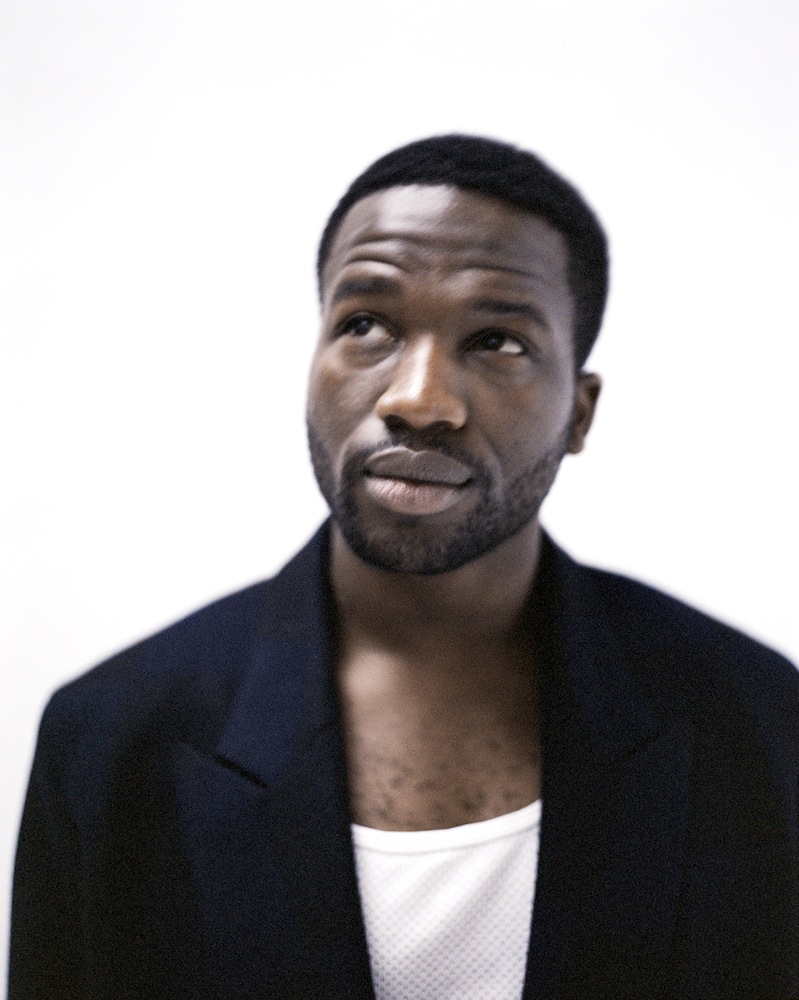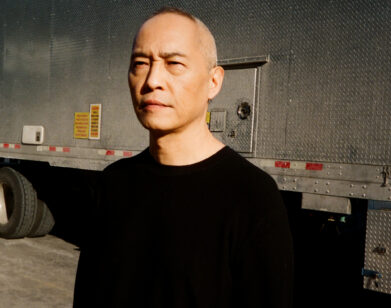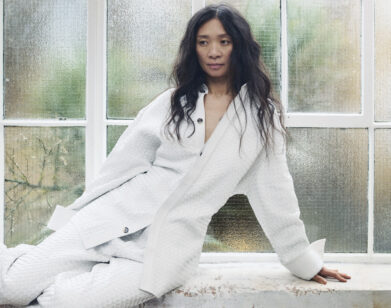The Thespian
SOPE DIRISU IN LONDON, NOVEMBER 2015. PHOTOS: BENJAMIN TIETGE. STYLING: KELLY-ANN HUGHES. GROOMING: SARAH JO PALMER USING AVEDA.
In 2012, Sope Dirisu attended an open casting call for the Royal Shakespeare Company. It was on something of a whim—he had just graduated from The University of Birmingham, where he studied economics and played American football, and the audition was located near his school. The North London native had acted before, both in school plays and as part of the National Youth Theatre of Great Britain, but had dissuaded himself from drama school. “I didn’t think I was good enough for drama school,” he recalls. “I thought I was really good for school standard, but on a national and international [level], I didn’t really weigh myself.”
Evidently, the RSC felt differently, and several months later Dirisu was on stage in Stratford-upon-Avon starring as Pericles in Shakespeare’s Pericles, Prince of Tyre. “It gave my CV a bit more weight, which was really fortunate,” he says.
Since then, things have gone rather well for Dirisu. He returned to the National Youth Theatre and spent eight months in its intensive REP Company program. At the program’s final showcase, he met his now-agent, and soon after began booking jobs on British television dramas such as The Mill and the J.K. Rowling adaptation The Casual Vacancy. Earlier this year, he was introduced to American audiences in the AMC series Humans. Co-starring Gemma Chan and Colin Morgan, Humans is set in an alternative present where robots (known as “synths” and designed to resemble humans ) are a staple of everyday life—from helping out with household chores to filling entry-level jobs. Dirisu plays Fred, one of a small group of sentient synths vying for their freedom.
Next up, Dirisu will make his film debut in The Huntsman with Charlize Theron, Chris Hemsworth, Jessica Chastain, and Emily Blunt (“I’ve got a really good part in that so I’m super excited,” he says) and Criminal with Ryan Reynolds. He just finished filming the Iraq War drama Sand Castle in Jordan alongside Henry Cavill, Nicholas Hoult, Glen Powell, and Beau Knapp, and is working on new BBC drama with Sophie Okonedo and Adrian Lester. When we speak on the phone just before the holidays, he is in the middle of a radio job opposite Games of Thrones’ Charles Dance.
AGE: 24
HOMETOWN: Edgware, North London
FAMILY LIFE: My parents are both Nigerian and very academic—my dad studied history at university and my mum studied law. I don’t think they were very keen for me to get involved in the performing arts at all. They were more interested in me becoming a doctor or an accountant or a lawyer or doing a professional job. It was definitely a long slog. They always came to support me hoping that the phase would wear out, but at university they really began to encourage me and accept that I was going to become an actor rather than a banker or a politician.
THE CIRCLE OF LIFE: Like every other kid, I really loved the Disney movies. My favourite Disney movie was The Lion King, hands down. I watch it now and I still get really upset when Mufasa dies. One time I was watching The Lion King [as a child], and I just looked at my dad and asked him not to die. I saw the musical in the last couple of years. There are some songs that are in the musical that aren’t in the original film—like “Shadowland”—and I remember almost being moved to tears, just because it’s so beautiful and I love The Lion King so much.
INTRO TO ACTING: When I was 11, I moved from primary school to secondary school [at Bedford Modern], and I moved to a school that I didn’t know anyone at. Acting was a really good tool for me to get to know different people and get engaged. I did a lot of sport as well. I started with the National Youth Theatre in 2006 and I’ve done a project with them every year since, so I’ve been with them almost 10 years. I still work with them. The last time I performed for the National Youth Theatre was two years ago, but I still go back and mentor and help direct bits and pieces. I try to help out as much as I can.
FIRST ROLE: My first role was in The Wizard of Oz. I had a chorus role—I played an Ozian, and I played a jitterbug as well. I must have been 12 at the time. I had a great time. There was a lot of singing involved [in my school productions]. I once played Javert in Les Mis. That was tough. Am I a good singer? I always tell people “no” because it’s easier. If you say yes, then people expect you to give them a take, so I just come straight out with the “no.” I wouldn’t say I was a super confident singer, but if I had to for a performance, I would be comfortable doing it.
FIRST TELEVISION SERIES: I don’t actually know. I booked one job before another, but I shot the second job first, and then the first job that I booked came out before the second one. I was in [an episode of] Utopia, which was on Channel 4. Then I did another Channel 4 drama called The Mill, which was set in the early 1800s at a cotton mill in Cheshire. My character, Peter, was a freed slave who had come from a plantation in Dominica to England. He had his revenge story that turned into a love story, [but it was also] a part of this bigger picture about these two things that existed side-by-side: The workers’ revolution in England and the abolition of slavery in the West Indies. Sometimes it’s easy to take certain events as if they happened by themselves historically, but it’s good to have a context in terms of what happened in the rest of the world.
HUMANS: The director who directed my short bit in Utopia was the first block director of Humans, and because we’d worked together, I presume, he was interested in seeing me for Fred. When I got the script, I thought it was incredible. I’m sure it’s been said over and over again in the reviews of the drama, but it didn’t feel far-fetched. It didn’t feel like a fantasy. It was science fiction, but it was something that could be science fact in the next 20 years—probably less. I think there’s something really terrifying in that.
LEARNING HOW TO BE A SYNTH: I sort of suffered because I was doing a job beforehand, so I wasn’t able to be there for the whole of the synth school. Thankfully Dan O’Neil, the choreographer, was on set the whole time. He was able to keep us all in the same world, so one wasn’t doing the robot while someone else was walking like a normal human being. But the synth school was great, because Dan had done a lot of work beforehand deciding what the basis of the movements would be—based on efficiency and using your eyes to move before you turn the rest of your body—and we were then able to give our own input when we got to synth school. For example the synth’s run was something that I developed with Dan during rehearsal. We thought, “What would be the most efficient way of running?” It was really great to feel I was able to have my own input in the world of the synths rather than just being told exactly how we had to move and had to work.
Breathing and blinking [were particularly difficult], because they are automatic things that your body does without even thinking about it. Synths don’t have to respire, so we decided it would be a function of their programming that their chests rise and fall so that they didn’t look really strange to human beings. So we had to remember to breathe, but not really to breathe. For example, there’s a scene where myself, Tom Goodman-Hill, and Theo Stevenson, were all in the garden playing football. It was a particularly cold day, so they had to spend so much time in the editing room painting out my breath. We were playing football, so obviously I was breathing quite heavily running up and down the garden. Also not to blink too much was a really tough ask, especially when my character was strapped to the gurney and wasn’t properly conscious—he was being tampered with. I had to keep my eyes open the whole time, which was a challenge.
THE HUNTSMAN: I got to interact with everyone on set, we spent a lot of time together. Chris [Hemsworth] is great. He was really fun to work with and really accommodating. There are quite a lot of children extras in the film, and obviously they are totally in love with him—he will never stop being Thor in their eyes. They were always asking him about his hammer and he was so gracious about it, just humouring them. It would be really easy for him to just disappear off into his trailer and not want to spend time with them, but he really gave them the time of day and I really respect him for that.
I had a super fanboy moment when I walked onto one of the sets. I hadn’t worked on any massive soundstages before then, and they recreated the whole interior of the castle of Emily Blunt’s queen. It was so detailed and so beautiful and obviously life-sized and working, and it just blew my mind. I was totally in awe of the work that they had done. I was giddy. If you looked a certain way, you were in a completely different world. I’m sure this is totally normal for people who have worked on big films all their lives, but as a first experience it was a really great one.
ROLE MODELS: It might sound very clichéd for a young black actor to mention Chiwetel [Ejiofor] or Denzel [Washington], but Chiwetel especially has been a real inspiration. He’s someone that my dad talks about in terms of being a proud Nigerian and hopefully I can have a career like that. I’m so happy to be represented by the same agency as him. My dad hit the roof with joy when I said, “Oh, by the way, Chiwetel’s agency have offered to represent me.” I think there are quite a lot of similarities between the two of us in terms of our journey: he joined the National Youth Theatre when he was quite young, he grew up in London.
ART AND COMMERCE: So far, I’ve been able to marry the two—doing work for the exposure and the work that I want to do have, at the moment, been the same thing. I told myself that I wouldn’t turn anything down for the first five years at least. It would be a case of trying to do really great work, but also being malleable and stretching myself as much as possible. If someone believes that I have the ability to do something, then it would be interesting to discover that aspect of my self and try and push myself as much as possible towards that character. Also, because I didn’t go to drama school, it is a training in itself—testing yourself and seeing how far you can go with certain characters.
For more from our 16 Faces of 2016, click here.







